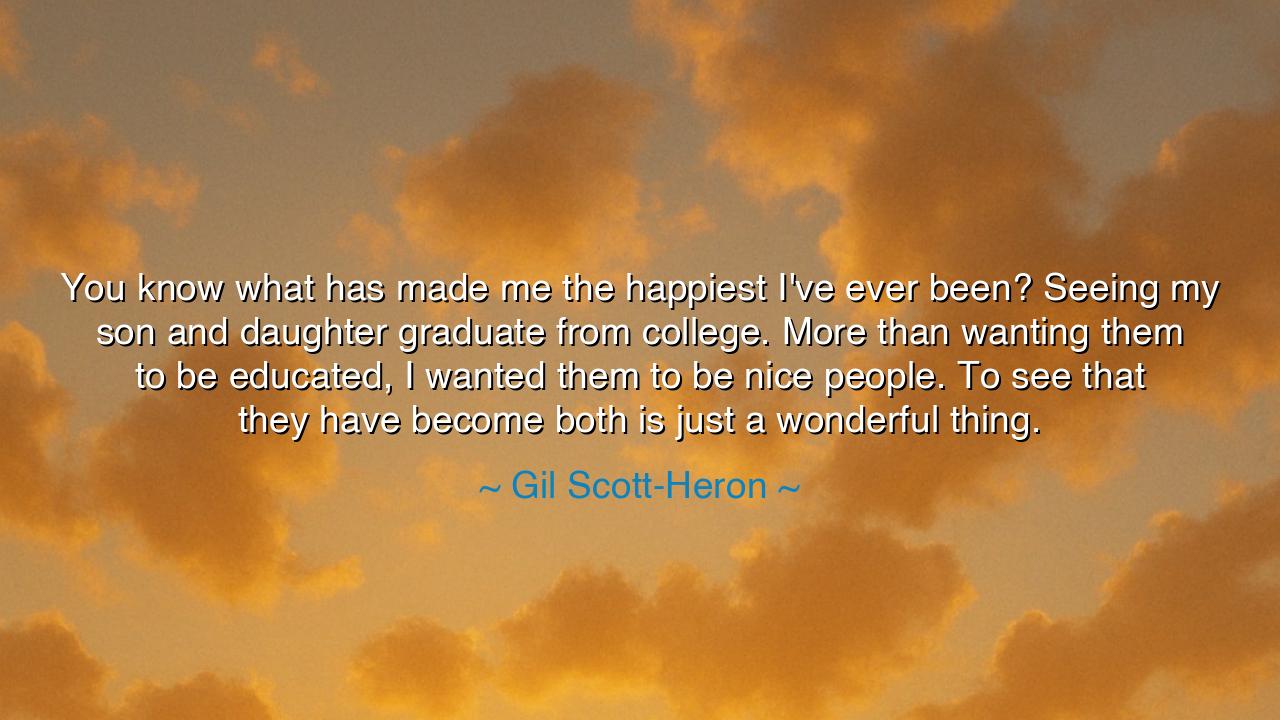
You know what has made me the happiest I've ever been? Seeing my
You know what has made me the happiest I've ever been? Seeing my son and daughter graduate from college. More than wanting them to be educated, I wanted them to be nice people. To see that they have become both is just a wonderful thing.






The words “You know what has made me the happiest I've ever been? Seeing my son and daughter graduate from college. More than wanting them to be educated, I wanted them to be nice people. To see that they have become both is just a wonderful thing” spoken by Gil Scott-Heron are more than a celebration of achievement; they are a meditation on love, values, and the enduring purpose of education. Beneath their warmth lies a profound insight: that the ultimate fulfillment in life often comes not from personal accomplishment, but from witnessing the growth and virtue of those we guide and nurture. Scott-Heron reminds us that education is not merely intellectual attainment, but the cultivation of character and kindness.
In the style of the ancients, one might hear in these words the echo of Aristotle’s teaching on virtue, that the good life is defined not only by knowledge or skill but by moral excellence and civic responsibility. To see children graduate is to witness the flowering of potential, but to see them emerge as both educated and kind is to witness the fulfillment of the highest parental duty: to mold citizens of character and conscience. Scott-Heron elevates graduation beyond ceremony, portraying it as a culmination of guidance, love, and ethical cultivation.
The origin of this reflection lies in Scott-Heron’s own experience as a parent and observer of life. Known for his artistry and social commentary, he understood that knowledge without virtue can be hollow, and achievement without kindness can be barren. Watching his children complete their education and retain their humanity became a source of joy beyond accolades or material success. His statement teaches that true happiness is intertwined with witnessing the growth of others, especially those whose lives we help shape.
History offers striking examples of this principle. Consider Benjamin Franklin, who, though remarkable in his own achievements, valued the moral and civic formation of his children and protégés. Similarly, Maya Angelou, renowned for her wisdom and literary contribution, celebrated the education and character of younger generations as the truest measure of her legacy. In both cases, as in Scott-Heron’s experience, the combination of education and virtue produces fulfillment that transcends individual accomplishment, extending into the next generation.
Scott-Heron’s words also highlight the dual purpose of education: to cultivate intelligence and to nurture humanity. Knowledge alone may open doors, but kindness, integrity, and empathy create the ability to walk through them with dignity and purpose. By emphasizing that he desired his children to be “nice people” as much as educated, he reminds us that character is the foundation upon which learning becomes meaningful. Graduation, in this light, is not merely a societal milestone, but a personal affirmation of values realized.
Dear listener, the lesson is profound: celebrate not only achievements, but the moral growth that accompanies them. Encourage those you guide — children, students, mentees, or peers — to pursue both knowledge and virtue. Recognize that the work of education extends beyond curricula and diplomas; it involves shaping hearts as well as minds. True joy is found in seeing those we care for navigate the world with competence, empathy, and integrity.
Take this wisdom into your own life: nurture those around you with guidance, love, and example. Encourage learning, yes, but also cultivate character, resilience, and kindness. Value progress in wisdom and empathy as highly as progress in grades or accolades. As Scott-Heron observes, the greatest happiness arises from witnessing the full flourishing of others, the harmonious blend of knowledge and goodness realized in human life.
Finally, let Gil Scott-Heron’s reflection inspire both parents and mentors: measure success not only by achievement, but by the moral and emotional growth of those you nurture. The ultimate fulfillment lies not in what we accumulate for ourselves, but in what we help others achieve in both education and virtue. To see the young become wise and good is to glimpse the true reward of effort, love, and guidance — a joy that echoes across generations and endures beyond our own time.






AAdministratorAdministrator
Welcome, honored guests. Please leave a comment, we will respond soon